Unit 10 Pompeii教案
Book-2-Unit-10-Pompeii说课材料
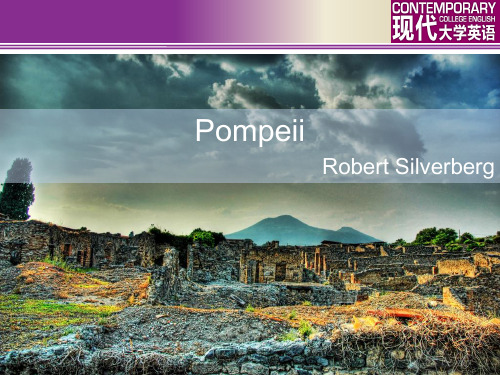
• 3. use specific verbs to describe things. (G3: the knowledge schema of vocabulary:running)
Group work (Pre-class Tasks):
• 4. the major gods and goddesses in Greek and Roman Mythology, such as: (Grouplai)
• 1) Jupiter, • 2) Juno, • 3) Apollo, • 4) Isis • 5) Neptune,
an ancient Roman town-city, destroyed and buried under 6 m of ash and pumice
in the eruption of Mount Vesuvius in 79 AD, first rediscovered in 1599, approximately 1600 years
Part 2 (Para. 8--20 ):
A detailed description of what happened on the day of the eruption.
Questions
1~2: Why is Pompeii a strange city? 3: How had Pompeii been until AD 79? 4: What happened in AD 79 and what was the result? 5: What happened to Pompeii seventeen hundred years after
现代大学英语第二册Unit_10_Pompeii_2(1)
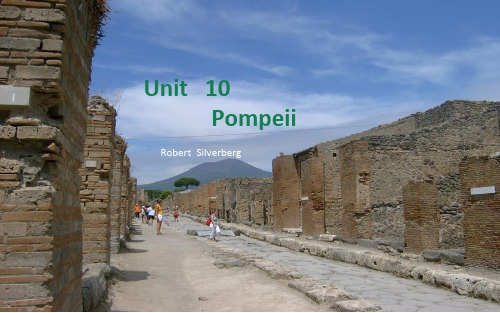
分词作状语时可分为以下几种形式:
* doing : 用来表示主动,且前后动作同时进行。 Returning home later, my friend learned that the police had been to the flat.
* having done: 用来表示主动,且动作发生在主句之前。 Having seen the film before, I decided not to see it again. * being done: 用来表示被动,且前后动作同时进行。 Being questioned by the police, he felt frightened.
I.
List:
Words
• • • • • • 1.mighty 2.overwhelm 3.perish 4.poisonous 5.reverberate 6.savage • • • • • • 7.shatter 8.shroud 9.stumble 10.topple 11.trample 12.absorb
• a picture tour: the temple of Jupiter
• a picture tour: theater
Today’s Pompeii
General introduction: an ancient Roman town-city, Founded in the 7th century BC, destroyed and buried by the eruption of Mount Vesuvius in AD 79, rediscovered in 1748, well-preserved and looks exactly like it was on its last day, a popular tourist destination now.
unit 10 Pompeii
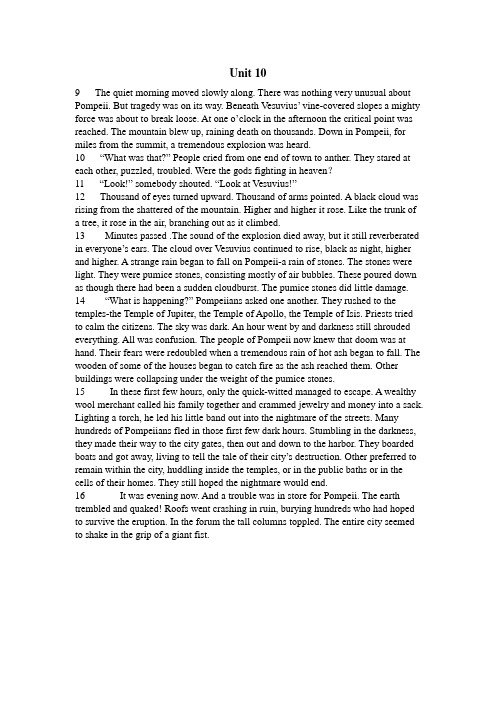
Unit 109 The quiet morning moved slowly along. There was nothing very unusual about Pompeii. But tragedy was on its way. Beneath Vesuvius’ vine-covered slopes a mighty force was about to break loose. At one o’clock in the afternoon the critical point was reached. The mountain blew up, raining death on thousands. Down in Pompeii, for miles from the summit, a tremendous explosion was heard.10 “What was that?” People cried from one end of town to anther. They stared at each other, puzzled, troubled. Were the gods fighting in heaven?11 “Look!” somebody shouted. “Look at Vesuvius!”12 Thousand of eyes turned upward. Thousand of arms pointed. A black cloud was rising from the shattered of the mountain. Higher and higher it rose. Like the trunk ofa tree, it rose in the air, branching out as it climbed.13 Minutes passed .The sound of the explosion died away, but it still reverberated in everyone’s ears. The cloud over Vesuvius continued to rise, black as night, higher and higher. A strange rain began to fall on Pompeii-a rain of stones. The stones were light. They were pumice stones, consisting mostly of air bubbles. These poured down as though there had been a sudden cloudburst. The pumice stones did little damage. 14 “What is happening?” Pompeiians asked one another. They rushed to the temples-the Temple of Jupiter, the Temple of Apollo, the Temple of Isis. Priests tried to calm the citizens. The sky was dark. An hour went by and darkness still shrouded everything. All was confusion. The people of Pompeii now knew that doom was at hand. Their fears were redoubled when a tremendous rain of hot ash began to fall. The wooden of some of the houses began to catch fire as the ash reached them. Other buildings were collapsing under the weight of the pumice stones.15 In these first few hours, only the quick-witted managed to escape. A wealthy wool merchant called his family together and crammed jewelry and money into a sack. Lighting a torch, he led his little band out into the nightmare of the streets. Many hundreds of Pompeiians fled in those first few dark hours. Stumbling in the darkness, they made their way to the city gates, then out and down to the harbor. They boarded boats and got away, living to tell the tale of their city’s destruction. Other preferred to remain within the city, huddling inside the temples, or in the public baths or in the cells of their homes. They still hoped the nightmare would end.16 It was evening now. And a trouble was in store for Pompeii. The earth trembled and quaked! Roofs went crashing in ruin, burying hundreds who had hoped to survive the eruption. In the forum the tall columns toppled. The entire city seemed to shake in the grip of a giant fist.。
小学英语四年级下册第十模块 教案
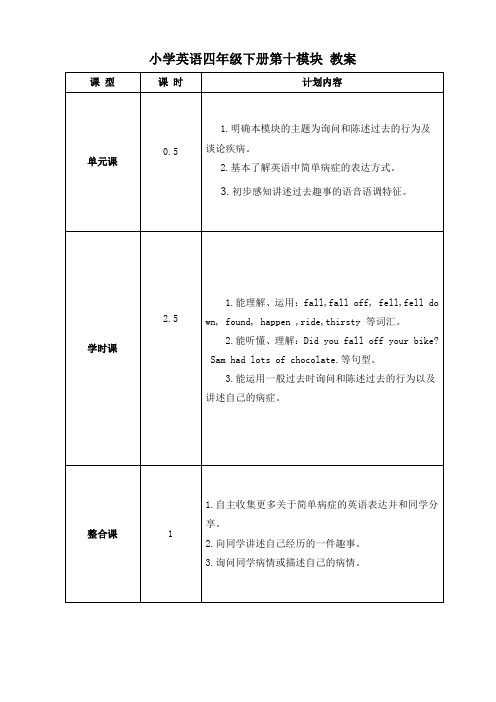
Activity1
Ss:I can see Jack and Jill.
Jack fell down.Jill found a town.
Fell down\found a town(read them together)
5、activity2
Pictue1:
学习
目标
1.熟练掌握本模块新单词及句型,能灵活运用。
2.能够运用本模块重点句型进行简单交流,自主创编对话。
探究
问题
全体学生能运用一般过去时询问和陈述过去的行为以及讲述自己的病症
应用
作业
作业练习
讲述自己的趣事
实践应用
小组内交流汇报自己的一件趣事
文化
阅读
了解英语中简单的病症表达方式
学习
难点:询问同学病情或描述自己的病情如何表达
教学
过程
学生活动
教师活动
二次备课
首学
阶段
Finishthe Pre-class homework.
1.Wordscollection.( expressions of illness)
2.Cultural reading (expressions of illness)
Pictures : stomach and head
What’s this? Teach it.
3、ho can you see?
Ask the students to describe the pictures.
stomach ache(teach it)
Practice in two.
Practice in four.
综合英语III教案
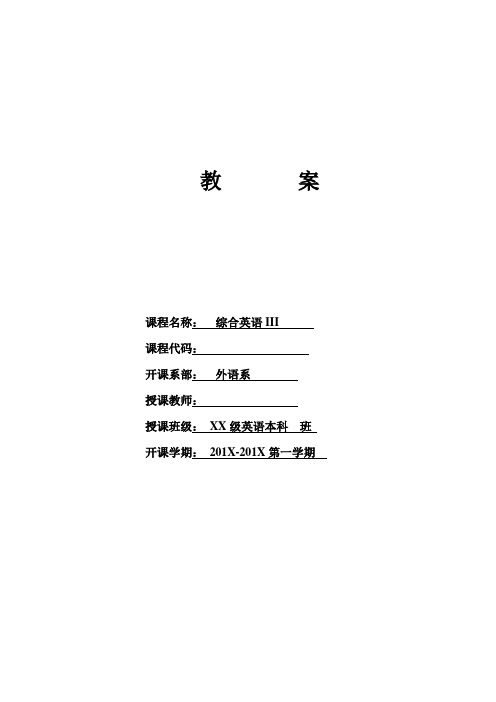
教案课程名称:综合英语III课程代码:开课系部:外语系授课教师:授课班级:XX级英语本科班开课学期:201X-201X第一学期一、课程简介课程类别:专业必修课授课对象:本科英语专业学时学分:68学时;学分2分使用教材:杨立民,《现代大学英语》,外语教学与研究出版社,20XX 年。
参考教材:杨立民,《现代大学英语精读教师用书》,外语教学研究出版社,20XX年。
宋兴蕴,《现代大学英语全程辅导》,辽宁师范大学出版社,20XX年。
薄冰,《薄冰英语语法》,开明出版社,1998年。
Martin Hewings,Advanced Grammar in Use, Foreign Language Teaching and Research Press& Cambridge University Press, 2001, 1st Edition.Sally Wehmeier, Oxford Advanced Learner’s English-Chinese Dictionary, The Commercial Press& Oxford University Press, 2004, 6th Edition.二、教学目标语音:能自觉地模仿和正音,正确掌握多音节单词、复合词和句子的常见重音模式;初步掌握朗读和说话的节奏感,并注意轻重变化对意义表达的影响;初步掌握语流中的语音变化规律、连续、辅音爆破和语音同化的技巧以及陈述句、疑问句和祈使句的语调。
语法:掌握主谓一致关系、表语从句、宾语从句、定语从句和状语从句等句型、直接引语和间接引语的用法、动词不定式和分词的用法、各种时态、主动语态、被动语态和构词法。
词汇:通过基础英语课、阅读课和其他途径认知词汇达4000—5000个(其中含中学已学2100个),正确而熟练地使用其中的2000—2500个及其最基本的搭配。
翻译:能独立完成课程中的各种翻译练习,要求理解准确、语言通顺;能借助词典将难度相当于所学教材里的英语对话、短文、一般性题材的文字材料译成汉语,翻译速度为每小时约220个英语单词,要求译意准确,文字通顺;能借助词典将内容熟悉的汉语文字材料译成英语,翻译速度为每小时约170个汉字,要求译意准确,文字通顺。
现代大学英语第二册精读unit 10 Pompeii
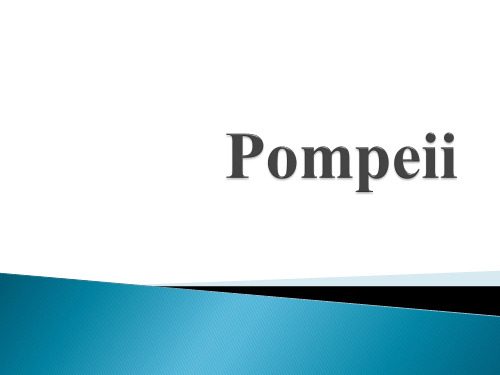
Rushing throngs, blinded by the darkness and the smoke, rushed up one street and down the next, trampling the fallen in a crazy fruitless dash toward safety. People panicked. They rushed into the streets to escape the falling buildings. It was dark and the air was full of smoke so they could not see where they were going. They rushed up one street and the next in a hopeless attempt to each safety. In their blind rush they ran over the bodies of people who had fallen down.
2. be in port: stop at the sea ports to load and unload cargo come into port; enter port; leave port
1. forum: the market place or public place of
ancient Roman city forming the center of judicial and public business
modern English: a public meeting or lecture involving audience discussion.
初中英语人教版八年级上册unit10 教学设计
八年级英语上册Unit 10 说课教案庆阳三中朱彩红I want to be a basketball player大家好!我说课的课题是BookⅡUnit 10 I want to be a basketball player。
根据英语课程标准规定,本着为学生发展为本的思想,通过听、说、读、写的训练,使学生获得英语基础知识和为交际初步运用英语的能力,激发学生的学习兴趣,为进一步学习英语打好初步的基础。
一.说教材1.教材分析:这个单元通过复习和学习一些关于职业的词汇,用be going to谈论长大以后打算做什么以及打算怎样实现目标,与七年级(下)和八年级(上)谈论将来的打算有着密切的联系。
本课是这单元的第四课时,在掌握了基础的基础上,谈论将来的打算。
2.教学目标:(1).知识与技能:掌握本课重点词汇reader, keep, fit, keep fit, foreign.本课主要句型:We are going to built a bigger subway. I am going to do sth.语法:用be going to表示一般将来时。
(2).能力目标:培养学生应用英语谈论将来计划,提高学生听、说、读、写等能力。
(3).情感态度价值观:通过谈论将来打算做什么以及准备怎样实现目标,让学生考虑自己的将来,及早为将来做好准备。
培养学生学习英语的强烈兴趣,乐于参加各种活动的积极情感,善于合作.(4).教学重、难点:重点是掌握本课重点词汇reader, keep, fit, keep fit, foreign.本课主要句型:We are going to built a bigger subway. I am going to do sth.语法:用be going to表示一般将来时。
难点是一般将来时be going to中be的具体形式和后面接动词原形的用法, 而学生运用所学知识谈论自己打算怎样做来实现目标则既是难点,又是能力训练点。
Unit 10 Pompeii
• Recovering from Earthquake of 62 A.D.
– Many repairs and reconstruction – Trying to Carry on with life as usual – Booming Economy
collapse and houses caught fire. • In the evening an earthquake struck, killing
hundreds of people. • Poisonous gas killed more people. • By midday on August 25, Pompeii became a
Pompeii: Before the Eruption
• Founded in the 18th century BC by the Oscans 奥斯坎人(意大利中南部的古代人); 奥斯坎语(属于意大利语族)
• 6th Century BC, under Greek rule
• 400 BC: Conquered by Samnites
Pompeii is unique because….
Excavations n. (挖掘的)洞,穴
• City rediscovered in 1590 by workmen digging a canal, and again in 1711.
• Recognized as Pompeii in 1736. • Fully excavated in 1748 • Skeletons found in 1982 that may have
The end of Structure.
Unit-10-Pompeii教案
WORD完整版----可编辑----教育资料分享Unit 10 Pompeii教案1.Background informationStudents’ presentation1)Author2)Notes on the text2.Understanding the text1)Watch video: The last days of Pompeii2)Read the text and answer questions in preview (p247)3.DiscussionWhy do people write about such terrible natural disasters? How do you explain the strong interest people show in the terrible mass sufferings of other human beings?Possible answer:a.natural disaster cause a lot of human tragedy, and human tragedy has always been a deep concern ofhuman beings.b.During a natural disaster, human beings usually reveal their true colorsc.The careful study of natural disasters may reveal scientific laws which may eventually help mandiscover ways to deal with natural disasters better.d.Natural disasters are often linked with human errors, and therefore can lead to our betterunderstanding of our mistakes and shortcomings.e.The memory of natural disasters can always remind us that natural power is still much greater thanhuman power. It is stupid arrogance on our pat to think that we can conquer nature. Man should forever be humble and learn to respect nature’s way, and learn whatever other useful lessons from them.4. Glossary----完整版学习资料分享----。
现代大学英语第二册Unit_10_Pompeii2
13.band 14.board 15.branch 16.collapse 17.crouch
18.descend 19.drift 20.flee 21.Intact
II. Phrases and Expressions
List:
• at hand • die away • plunge into • in store for a rain of come down from strike on an arm of
例:As the book is written in simple English, the book is easy to read. ----Written in simple English, the book is easy to read
分词作状语时可分为以下几种形式:
* doing : 用来表示主动,且前后动作同时进行。 Returning home later, my friend learned that the police had been to the flat.
Pompeii’s Yesterday
• a picture tour: a bird’s-eye view
• a picture tour: a street leading to Mt. Vesuvius
• a picture tour: the temple of Jupiter
• a picture tour:theater
英释:To go to Pompeii today is like taking a trip to the past. The city is no langer a dead city.You can imagine what was going on around you.
